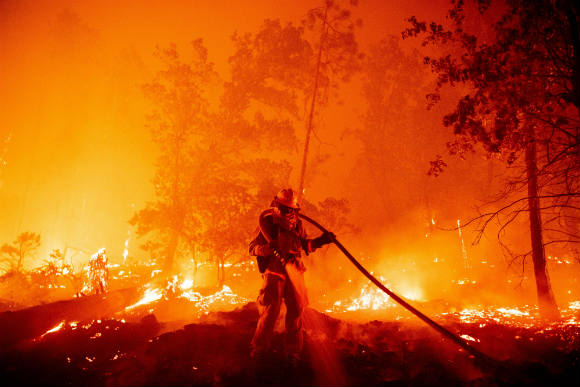JUNE 30, 2015
7 DIFFERENCES BETWEEN STATE LANDS AND PUBLIC LANDS
1.
The American public owns all federal public lands, including National Parks, National Forests, Wilderness areas, wild and scenic rivers, and wildlife preserves. Every American has a personal stake and a guaranteed say in how these places are cared for. And all Americans have the right to experience and enjoy these places.
2.
By contrast, state lands are held by state governments and most of them are required to generate revenue. State lands are not owned by state residents in the same way as public lands, and Americans who live in other states have no voice whatsoever in their management. Many states do a fantastic job of managing state parks and protecting recreation, but they are governed by different rules than federal public lands. You don’t have a right to be on state lands, or the same rights as to how they are managed and sold.
3. If it makes short-term economic sense for a state to lease a bunch of its land for mineral development, subdivisions, extraction, or logging, states are well within their rights to do so.
States have no obligation to involve state residents in these decisions.
4. Most states are required to balance their budgets and have a hard time running any big deficits, so they make decisions under very constrained time horizons. Having a tough economic year? Sell some land. Can’t afford wildfire expenses? Subdivide. Does this impact people's right to these places? It’s simply not relevant when most states are balancing their budgets.
While we are all owners on federal public lands, we are customers on state lands.
5.
All Americans enjoy these places, and all Americans share the costs to preserve these places. On average, we pay about $4 a year in income tax for public lands. If these places were transferred to the states, their governments and taxpayers would be solely responsible for managing upkeep, infrastructure, building roads, and fighting fires. This means western taxpayers would be overburdened, or states would be forced to sell off lands to pay for maintenance. What would states sell and how would it impact the outdoor recreation community and business world?
6. Some people in the West bristle at the thought of a distant federal bureaucrat telling them what to do. In reality,
federal land management is incredibly decentralized. Local forest supervisors and park superintendents run the show with a ton of local input. While policies are crafted at the national level, they are implemented by locals at the local level.
7. P
ublic lands, owned and managed by all Americans, are the backbone of a $887 billion outdoor recreation economy, millions of jobs, and thriving local economies in the west. Putting aside the policy, the fact that we own public lands is part of our experience on public lands. We are shareholders on these mountains, rivers, deserts, and forests. We have built lives and businesses inspired by what these places mean to us.
Agreed to your statement. I’m done arguing with most like minded individuals. Thanks for dealing with my tantrum. Because ya I’m pissed. And yes I understand a forest closing down. The whole state is a different story in my opinion. We hunt hard enough out here don’t let the powers that be make it impossible. I’m out,sorry if I made anyone irritated. Hopefully I’ll talk to ya all on better terms.
JUNE 30, 2015
7 DIFFERENCES BETWEEN STATE LANDS AND PUBLIC LANDS
1.
The American public owns all federal public lands, including National Parks, National Forests, Wilderness areas, wild and scenic rivers, and wildlife preserves. Every American has a personal stake and a guaranteed say in how these places are cared for. And all Americans have the right to experience and enjoy these places.
2.
By contrast, state lands are held by state governments and most of them are required to generate revenue. State lands are not owned by state residents in the same way as public lands, and Americans who live in other states have no voice whatsoever in their management. Many states do a fantastic job of managing state parks and protecting recreation, but they are governed by different rules than federal public lands. You don’t have a right to be on state lands, or the same rights as to how they are managed and sold.
3. If it makes short-term economic sense for a state to lease a bunch of its land for mineral development, subdivisions, extraction, or logging, states are well within their rights to do so.
States have no obligation to involve state residents in these decisions.
4. Most states are required to balance their budgets and have a hard time running any big deficits, so they make decisions under very constrained time horizons. Having a tough economic year? Sell some land. Can’t afford wildfire expenses? Subdivide. Does this impact people's right to these places? It’s simply not relevant when most states are balancing their budgets.
While we are all owners on federal public lands, we are customers on state lands.
5.
All Americans enjoy these places, and all Americans share the costs to preserve these places. On average, we pay about $4 a year in income tax for public lands. If these places were transferred to the states, their governments and taxpayers would be solely responsible for managing upkeep, infrastructure, building roads, and fighting fires. This means western taxpayers would be overburdened, or states would be forced to sell off lands to pay for maintenance. What would states sell and how would it impact the outdoor recreation community and business world?
6. Some people in the West bristle at the thought of a distant federal bureaucrat telling them what to do. In reality,
federal land management is incredibly decentralized. Local forest supervisors and park superintendents run the show with a ton of local input. While policies are crafted at the national level, they are implemented by locals at the local level.
7. P
ublic lands, owned and managed by all Americans, are the backbone of a $887 billion outdoor recreation economy, millions of jobs, and thriving local economies in the west. Putting aside the policy, the fact that we own public lands is part of our experience on public lands. We are shareholders on these mountains, rivers, deserts, and forests. We have built lives and businesses inspired by what these places mean to us.


